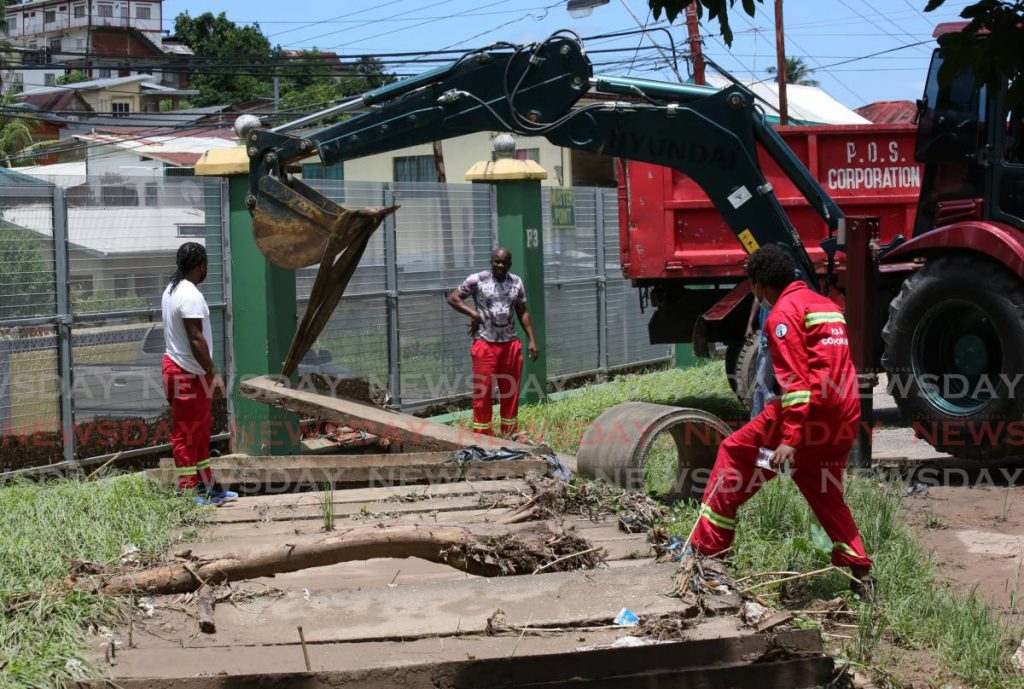Young, Port of Spain Corporation move to fix St Francois flood issue

FLOODING in and around St Francois Girls' College in Belmont is not expected to follow the next heavy shower, as councillor for Belmont East Nicole Young moved with workers from the Port of Spain City Corporation to fix a clogged drain, on Tuesday.
Just days prior, a short but heavy downpour saw the drain overflow once again, causing flooding on the school compound.
Young told Newsday the problem has existed for a while.
Under the guidance of the corporation's assistant city engineer and heavy machinery, the workers began to clear a clogged canal, which runs through the secondary school into a larger drain along the main road.
Corporation workers prepared to strap concrete slabs covering the drain when Newsday visited.
In an opening in the drain, a length of galvanize was trapped, among other debris, silt and rocks.
The assistant city engineer explained, "Due to the recent heavy rainfalls, we've had a large volume of rainwater run-off. The run-off would have brought down debris like silt.
"But even before we had the heavy rains last week, there was a build-up of debris at the intersection of the drains and front perimeter fence. As you can see, there is spawning of water, meaning there is some form of clog."
He said the clog will restrict the flow of water, causing the drain to overflow into the school compound and through the front gate.
The road has also noticeable deteriorated.
The engineer said when the slabs are removed, the backhoe will use its back bucket to take out the silt and debris, load it to a truck and remove from the site.
"To remove (the silt) may be a challenge, especially manually. Heavy equipment will speed up the job and make it easier.
"To prevent a build-up of silt, you need continuous maintenance. The removal of silt isn't difficult but if you do have a blockage, you will see silt collecting."
Clearing after floods, landslides: Don't throw rocks in the drains
ALTHOUGH Belmont's neighbour St Ann's faces problems with flooding, just like many other communities across the country, significant damage to property is rare. Many parts of South and Central Trinidad, conversely, fear property damage from flooding in any rainy season.
St Ann's features a wide and relatively deep river flowing through it, which in recent times has reached levels seen perhaps once a decade, residents estimate.
Last week, upper Ariapita Road actually faced unprecedented flooding, or at least flooding never before witnessed in that particular area by lifelong residents.
Heavy rainfall led to miniature landslides, which blocked drains, causing water to build-up and overflow into yards. Fortunately, no human lives were lost.
The water build-up, however, became too overwhelming for the river to hold, and as it overflowed, several vehicles became completely submerged and were carried into the actual river.
Many more vehicles were badly damaged.
The adjacent road remained waterlogged in several parts of St Ann's even after the rain stopped and river levels dropped.
Upper Ariapita Road, past Cascadia Hotel, large rocks and heaps of dirt remained, completely covering the roads, blocking cars.
Members of the community immediately began to assist stranded drivers, whose cars were stuck in the rubble.
Within a few hours, the road was passable, and together with the city corporation, they worked into early hours of the next two days to clear the road completely.
Days later, although without considerable rainfall in St Ann's, many parts of the river appeared more shallow than before the previous week's heavy rain.
Large rocks which would have fallen in from landslips, or were thrown in when attempts were made to clear the road, are now concentrated in certain areas.
It raises concerns of an increased likelihood or a similar similar or worse flood, if the rocks are not removed.
Of course, the general public cannot prevent landslips but there are practices which must be discouraged to stop the public's contribution to flooding.
In haste to clear the road for drivers to pass, discarding rocks into rivers and drains, like discarding anything else, can contribute dramatically to flooding.
"(Throwing) items in the water courses or rivers, whether it be natural, like rocks, or foreign, in terms of appliances and bottles (must be discouraged)," the city engineer said.
"When you throw these items in the water courses and you add (things like rocks), it will reduce the volume of the capacity of the drains and water courses and eventually at some point on the watercourse or river, you may have a blockage, especially where we have narrow underground drains."
He said if there is an event which causes a disruption to the movement of residents or drivers, the public should notify the Disaster Management Unit at the Port of Spain City Corporation and the Office of Disaster Preparedness and Management.
The situation should be described clearly and if the person reporting the incident, or others, wish to help alleviate an obstruction, they should seek advice and ensure they proceed safely.

Comments
"Young, Port of Spain Corporation move to fix St Francois flood issue"